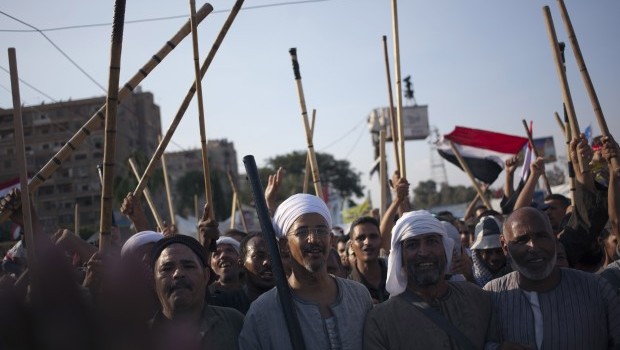Muslim Brotherhood extremist leaders in Egypt wish for what the army has threatened. They want their protests to be dispersed by force in order to turn the incident into an international affair and publicize long, lamenting funerals.
Their decision to involve women and children—who now make up half the protesters—does not only protect male protesters but also serves their image in the media because it makes them innocent victims worthy of sympathy.
The Brotherhood extremists’ worst fear is that people will forget them and let them be in Rabaa Al-Adawiya and Al-Nahda squares. This is why they are organizing marches, blocking roads and threatening the media.
The Egyptian authorities have helped them in two ways. The first was by threatening to end the sit-ins by force. This announcement has mobilized media outlets from across the globe as they wait to broadcast the clashes live. The second was that the Cabinet kept the Brotherhood’s cause alive by talking about them and their protests. It forgot its plan for the future, the constitution and the elections. It forgot to talk about the rest of the 90 million Egyptians.
The Brotherhood’s leaders are the ones controlling the protests’ squares. They are leading the protests and feeding on the reactions of the other camp by exchanging debates and threats. If the Salvation Front and the June 30 alliance, which represent 80 percent of political parties in Egypt, had launched its political work by preparing for the promised democratic project and the elections, the formula would have shifted and the Brotherhood would have been the party who wanted to end the sit-ins.
The Brotherhood extremists’ strategy to paralyze interim prime minister Hazem El-Beblawi’s cabinet succeeded. They took the army hostage with Rabaa Al-Adawiya to the point that most of their statements are focused on responding to what is being said or what must be done there. The army has done well in not falling into the Brotherhood’s trap of forcefully ending the protest because if blood is shed, the Brotherhood will turn this into an event similar to the famous “Battle of Karbala.” They will thus justify their violence and extremism. The world’s talk will be that the army ousted Mohamed Mursi and murdered the peaceful protesters!
What would happen if the army left them in these squares, if the cabinet ignored their statements and if the Salvation Front intensified its efforts to present a successful political model for a future Egypt? I think the protests would gradually die, the Brotherhood extremist leaders’ control would weaken, and more rational leaderships would emerge from the protests, as long as the door remained open for them to participate in dialogue and elections.
Leaving Rabaa Al-Adawiya protests alone, being patient with the Brotherhood’s statements and harm and shifting its attention towards the people’s real causes is the course the regime should take. The other political powers must acknowledge that the Brotherhood did them a favor. The Brotherhood’s protests have united the youths with the Nasserites, the revolutionists with the Wafd Party, Al-Azhar supporters with some Salafis and Copts, the liberals with the leftists and the military with the civilians. These contradictory parties came together after the Brotherhood threatened them while it was in power and issued a constitution that suited its interests alone and aimed to dominate the state. The moment in which they are united, in opinion and leadership, may not repeat.

The apprehension that the unity of different elements and factors in Egyptian society may not last long is based on conclusions that are not viable. The Interim Establishment is too humane and merciful, otherwise such gatherings could be dispersed without causing bloodshed and by applying tactics that would undo all the conspiracies that the MB combine could muster. The Interim administration could easily choke the financial help the MB combine is getting from abroad, beside withholding food supplies to those who are camping in the squares and mosques. Moreover Karbala is a far fetched analogy. None of the leaders of the MB combine have that aura of sanctity that Imam Hussein had, nor the Interim Administration is so ruthless as the commanders of the Yazid’s forces. If the efforts of the Grand Sheikh of Al Azhar fail to materialize, the MB combine is bound to face a situation which would threaten its very existence.